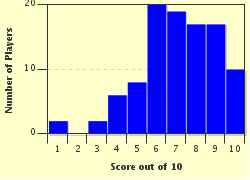Quiz Answer Key and Fun Facts
1. A clergyman may be described as which of these choices?
2. Which Archbishop of Canterbury famously used a 'fork'?
3. There was no movement to reform the church in England before Henry VIII instigated it.
4. A great Renaissance scholar visited England and enjoyed the hospitality of Sir Thomas More; who was this man?
5. Martin Luther was which of these?
6. This Archbishop of Canterbury's surname means highest praise; who was he?
7. This Dean of St Paul's was also a poet in the early seventeenth century; who was he?
8. A part of London is called Blackfriars. Who were the Blackfriars?
9. Which monarch was, by sixteenth century standards, very tolerant as they left folk free to believe what they liked so long as outward conformity in religion was practised?
10. Two people claim to be Primate of England; who are they?
Source: Author
KATE211
This quiz was reviewed by FunTrivia editor
agony before going online.
Any errors found in FunTrivia content are routinely corrected through our feedback system.


